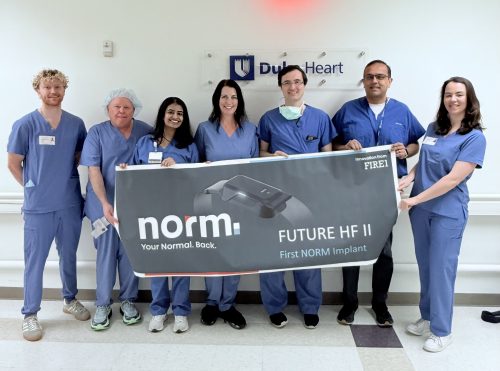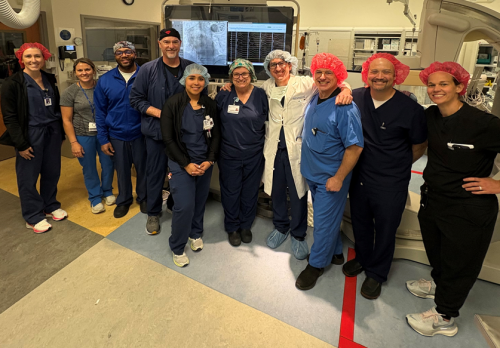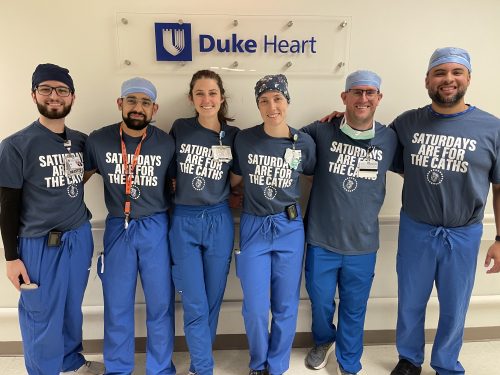Chief’s message: Happy Easter & Chag Sameach!
To all who are celebrating Easter and the end of Passover, we hope you’re having a wonderful weekend with family and friends.
The last few weeks and months have seen significant challenges for health care and academic medical centers with reduced research funding and reductions in budgets that are putting significant strain on our mission to discover and deliver cardiovascular health while training the next generation of leaders. This week’s edition of the Pulse we highlight several stories and actions that demonstrate the resilience and work that will continue to move us forward in Duke Heart and academic medicine. We share stories of complex care for patients, team comradery with an outing to support a colleague performing in a musical, clinical trial enrollment firsts in two different studies for patients in Durham and Raleigh, a listing of faculty who were awarded increasingly difficulty to obtain research funding, and the expansion of our services with non-emergent cardiac caths on Saturdays. We will continue to work to identify ways to improve how we can get closer to meeting the needs of our community and patients, and hope to describe important partnerships and work in the upcoming months that will enable us to continue to achieve our missions.
Duke Heart CRU is on FIRE
The Duke Heart Clinical Research Unit is on fire with the first enrollments of patients into two clinical trials for patients with heart failure (HF).

Late last month, a team led by Marat Fudim (Duke PI) enrolled their first and second patients into the Early Feasibility Study of the NORM™ System in Heart Failure Patients (FUTURE-HFII), an industry-funded trial sponsored by Foundry Innovation & Research 1, Limited (FIRE1).
The study is examining the use of the FIRE1 NORM remote sensor system, which offers a way to manage HF by directly measuring fluid volume in the inferior vena cava (IVC). The sensor is implanted into the IVC in a cath lab procedure. It then expands and contracts with the IVC. Once out of the cath lab, a belt worn by the patient for a few minutes daily will activate the sensor and capture data regarding their IVC fluid volume. The belt sends data to “the cloud,” where software will process and generate additional information on the patient’s IVC, monitoring the patient’s condition and then alert their care team if involvement is needed.
The first Duke patient enrolled was the first patient in the world to have the NORM system implanted.
There are five study locations for the FUTURE-HFII trial in NY, OH, TX, and NC. Duke was the first enroller, but all are currently recruiting. The overall study will enroll up to 25 patients.
This week, Dan Friedman and his team at Duke Raleigh Hospital enrolled the first patient in the U.S. into the Fast Induced Remodeling in Heart Failure with Preserved Ejection Fraction (FIRE-HFpEF) industry-funded clinical trial sponsored by Medtronic. There are 8 trial locations in the U.S. with sites in FL, IL, KS, NC, OK, TX, and VT. Dan Friedman is serving as Duke’s site PI.

FIRE-HFpEF is a multi-center, 70-patient randomized feasibility study of pacemaker algorithms to improve cardiac output and decrease concentric remodeling in patients with HFpEF and LVH:
1. Personalized lower rate – allometrically defined based on height and ejection fraction.
2. Remodeling pacing – pacing at ~100 bpm at night via the conduction system pacing lead. This has been experimentally shown to reduce hypertrophy and improve LV diastolic filling.
All patients undergo implantation of a commercially available Medtronic dual-chamber pacemaker with a left bundle branch area pacing lead. The study employs a crossover design so all patients will receive treatment with the investigational pacing algorithms at some point during the 12-month study. The primary endpoints are MRI and echo measures of remodeling, and quality of life.
Please contact Dr. Friedman if you have any questions or a patient who may be appropriate for the study.
Excellent work — way to go!!
Saturday Caths
Last weekend, our Duke University Hospital interventional cardiology team began a six-week pilot of performing cardiac catheterizations on Saturdays as a means of improving care for patients, reducing wait times and overall patient volume going into the work week. The Saturday teams consist of an attending interventionalist and four catheterization lab staff members — two nurses and two cardiovascular invasive specialists. Overall daily catheterization volumes have been steadily increasing, which has posed challenges for the team. The ability to work cardiac caths into the weekend should help ease schedule volumes, especially on Mondays.
“We really appreciate the team and their willingness to help support patient care in this aspect,” says Rebecca Dial, RN, nurse manager, operations for the Adult Invasive Labs and CVSSU for Duke Hospital. “It’s good for the health system overall and for patients to be seen more quickly where possible — particularly if they have an event late in the week. We appreciate our staff being willing to help support this effort and to have a little fun and great attitudes while doing so.”

Thanks to team members Tony and Sarah, the team celebrated the start of Saturday shifts with special t-shirts that read, “Saturdays are for the Caths,” meant to generate enthusiasm and some team bonding. After the program pilot period, leadership will reevaluate overall case volumes to determine if the effort has been beneficial.
Great work, everyone!
ICYMI: AHA Scientific Statement on Prevention of HF Released in Circulation
Congratulations to Carolyn Lekavich and her co-authors on their publication out this week in Circulation! Risk-Based Primary Prevention of Heart Failure: A Scientific Statement From the American Heart Association was published online April 16, 2025.
Great work!
On the Move Again After Chronic Total Occlusion
Duke Catheterization Advances Treat Complex Coronary Artery Blockages
Mitchell Doub, 64, could barely walk across his living room without experiencing debilitating chest pain thanks to an advanced form of coronary artery disease called chronic total occlusion. After Doub was told nothing could be done, Duke Health’s Islam M. Othman, MD, offered a solution. Dr. Othman performed a complex catheterization procedure that opened Doub’s blocked artery and gave him immediate symptom relief. Now Doub is back to working out and looking forward to an upcoming trip to Colorado. “If you have a chronic total occlusion, don’t walk; run to Duke,” he said.

As Mitchell Doub of Winston Salem, NC, celebrated an exciting win for Appalachian State University football in 2005, a burning pain in his sternum quickly brought him back to Earth. He soon learned he had a major blockage in one of the arteries that supplied blood to the left side of his heart. Doub underwent percutaneous coronary intervention (PCI), a minimally-invasive procedure that involves inserting a catheter into a major artery and through blood vessels to reach a buildup of fatty deposits called plaque that comprises the blockage. Once there, his interventional cardiologist inflated a tiny balloon to compress the plaque and placed a mesh tube called a stent to keep the artery open. Two weeks later, Doub was back on his feet playing basketball with his buddies.
Nearly two decades later, in January 2024, Doub noticed a familiar pain during his workout. “I kept trying to run, and each time I would feel that sternal pain, but it went away if I slowed down to a walk. And I thought, ‘Well, this is not good,’” Doub said.
Before long, Doub was undergoing another PCI procedure to treat a 95% blockage in the same place as before. This time, the blockage was calcified, meaning it was hard like a rock and much more difficult to treat. When his doctor tried to clear the obstruction, Doub’s artery ruptured — a life-threatening complication. Five days later, Doub had to undergo open heart surgery to bypass his blocked artery.
About six weeks into recovery from open heart surgery, Doub started having chest pains again. His new bypass vessel had collapsed, putting him right back where he started. The original obstruction was now a chronic total occlusion (CTO) — a long-lasting and complete blockage in a coronary artery. Doub’s local doctors told him there was nothing else they could do. His heart bypass surgery had failed, and attempting another PCI procedure was too risky. Instead, Doub would have to hope his heart would adapt by growing more blood vessels on its left side. “I was basically going to be an invalid for the rest of my life or until I built up sufficient collateral vascularization, which could take years,” Doub said. Doub’s daughter made an appointment for him with Dr. Othman.
For Doub’s procedure, Dr. Othman performed an intravascular lithotripsy, which uses sonic sound waves to break up calcifications. This technology was first designed to treat kidney stones. “In less than 90 minutes, he had me fixed,” Doub said. “Right after he did the procedure, I had no chest pain at all, immediately.” Within weeks, Doub was back to running and working.
*This story was posted April 15 on dukehealth.org.
Duke Arringdon Team Outing Supports Turgeon, Musical
One of our nurse clinicians, Natalie Turgeon, is appearing in the musical Merrily We Roll Along at the Burning Coal Theater Company in Raleigh. A number of her colleagues from Duke Cardiology of Arringdon went as a group to see her performance on Friday, April 11.

We heard it was a great performance! The show runs through April 27, so there is still time to see it. For tickets, please visit: https://burningcoal.org/.
New Funding Awards, March 2025
Congratulations to the following faculty members in the Division of Cardiology who received new funding award notifications in March:
Sponsored Research:
- Adrian Hernandez has received an award from the Patient-Centered Outcomes Research Institute for a project entitled “PCORnet Governance, Collaboration, and Operations to Facilitate PCORnet(R) Studies of National Scope.” Total funding will be $6,998,274.
- Raymond Kim has received a sub-award (1R01HL171150-01A1) through the Houston Methodist Research Institute for a project entitled “Sudden Death Risk Assessment and Mechanistic Insights in Arrhythmic Mitral Valve Prolapse Using Cardiac MRI and Circulating Proteomic Biomarkers.” Total funding will be $151,459.
- Gedion Ngeno has received a sub-award through Indiana University for a project entitled “Designing and Implementing a Registry for Patients with Structural Heart Disease at the Moi Teaching and Referral Hospital(MTRH) in Eldoret, Kenya.” Total funding will be $247,284.
- Manesh Patel has received an award from the California Health Care Foundation for a project entitled “HAIP Practice Network Cohort in California.” Total funding will be $30,000.
- Sudarshan Rajagopal has received an award from the American Heart Association for a project entitled “Engineering a New Class of Therapies for Heart Failure.” Total funding will be $550,000.
Industry-Sponsored Clinical Trials:
- Adam Devore has received an award from Merck Sharp & Dohme LLC. for a project entitled “Merck – CHA – Guidelines Implementation Study – Industry.” Total funding will be $987,557.
- Marat Fudim has received an award from Cardiosense, Inc. for a project entitled “SEISMIC-HF II Clinical Validation Study.” Total funding will be $76,911.
- Michel Khouri has received a sub-award through Brigham and Women’s Hospital for a project entitled “REVEAL.” Total funding will be $167,071.
Well done!
Duke/DUHS Update: International Team Members & Travel
In an email to all staff on Friday, April 18, Antwan Lofton, VP, Human Resources and Chief Human Resources Officer, and Mary Pat McMahon, Vice Provost and VP, Student Affairs, wrote:
“Duke is fundamentally committed to welcoming and supporting international faculty, staff, and students as vital members of our learning and research community. Just as Duke has adapted with federal immigration policy throughout the years, the University is working to ensure compliance with recent and ongoing changes to federal regulations. We write to provide up-to-date information and to direct international community members to the right resources at a time of unprecedented uncertainty and challenge.
As of today, we recommend members of our international community avoid non-essential international travel until further notice. More details can be found here. Other recent DVS updates can be found here.
Duke Visa Services (DVS) will continue posting updates directly to the DVS website. We encourage members of our international community to consult with a DVS liaison to address questions, since every immigration situation is different. Email visahelp@dm.duke.edu or find your Duke Visa Services liaison here.
DVS and the Duke International Student Center, along with representatives at schools and units across Duke, will continue working directly with affected students, faculty, and staff to provide guidance and support via email and in person.
To read more about how Duke is responding, access support resources, and stay up to date, please visit the International Travel page on the new University Updates website. We will continue to update these resources as conditions change.
As we work together to navigate these challenges, we again want to reiterate our commitment to supporting international faculty, staff, and students here at Duke. We also want to thank our teams in DVS, DISC, and faculty and staff across Duke’s ten schools for working to engage students and provide real-time updates and information in a period of transition.”
Upcoming Events & Opportunities
April 22: Earth Day — Earth Day has been commemorated on April 22 for the past 55 years. There have been a variety of events throughout the month of April for the Duke community. This week, starting on Tuesday and running through April 29, Duke Chapel will be illuminated green to celebrate. For additional events please visit: Earth Month 2025 around Duke University.

April 23: Administrative Professionals Day

Cardiology Grand Rounds
April 22: Tricuspid Interventions: Worth a Try? with Nate Goodwin. 5 p.m., Zoom only.
April 24: ACS Guidelines: Something Old, Something New, Something Borrowed, Somethings Left to Do with Sunil Rao of NYU Langone Health. 5 p.m., DN 2002 and via Zoom.
April 29: Application for Cardiac Computed Tomography: What a Cardiologist Needs to Know with Lonnie Sullivan. 5 p.m. Zoom only.
If you missed any of our CGR’s from the past year, all Duke Cardiology Grand Rounds recordings are housed on Warpwire. To access recordings please visit:
NET ID and password are required. Enjoy!
CD Fellows Core Curriculum Conference
April 23: HF/Txp with Joshua Sink. Noon, DMP 7W70.
April 25: DHP Case presentation with Jonathan Kusner. Noon, hybrid: Zoom & DMP 7W70.
April 30: EP with Jawan Abdulrahim and Aarti Thakkar. Noon, DMP 7E39.
Upcoming Duke Heart CMEs
The following CME activities, sponsored by Duke Heart, have been scheduled. Registration is coming soon for Fall events; now open for April 26th and June 7th symposia.
- April 26, 2025: Duke Structural Heart Symposium (live event at Trent Semans Center in Durham). Registration is required; the event is free.
- June 7, 2025: Duke Heart Failure Symposium (live event at Durham Convention Center in Durham). Registration is required.
- October 4, 2025: Duke Cardiac Sonography Symposium (live event at Trent Semans Center)
- October 31, 2025: 17th Annual NC Research Triangle Pulmonary Hypertension Symposium (live event at Durham Convention Center)
CTSI Research Symposium to Focus on Strengthening Rural Health
May 8: Strengthening Rural Health: Research, Access to Care, and Community Collaboration. 12:30 to 2 p.m., Chesterfield Building, 701 W. Main St., Durham, NC.
Panelists will offer in-depth discussion about the importance of including rural communities in research, as well as strategies to overcome barriers to participation. Topics will include social drivers of mental health and the role of faith communities in addressing maternal mental health in rural communities.
To learn more and to register, please visit https://ctsi.duke.edu/news/ctsi-research-symposium-focus-strengthening-rural-health.
Have news to share?
If you have news to share with the Pulse readership, contact Tracey Koepke, director of communications for Duke Heart & Vascular, at tracey.koepke@duke.edu. We would love to hear about your latest accomplishments, professional news, cool happenings, and any events or opportunities that may interest our team. Please call with any questions: 919-681-2868. Feedback on Pulse is welcome and encouraged. Submissions by Noon on Wednesdays will be considered for weekend inclusion.
Duke Heart in the News:
April 9 — Sean Pokorney
JAMA Cardiology/Research Letter
April 11 — Robert Califf
JAMA/Medical News
How Dismantling DEI Efforts Could Make Clinical Trials Less Representative
April 11 — Duke Health/RACE-CARS
The Robesonian
April 13 — John Alexander
Medical Dialogues
April 14 — Duke Health
Triangle Business Journal
Where UNC Health’s $371 million hospital will be built
April 14 — Duke Health
Business NC
N.C. Senate budget pitches $638M for Triangle kids’ hospital
April 14 — Duke University
Axios Charlotte
North Carolina faces $668M NIH funding cut
April 14 — Duke University Hospital/CARMAT
MDDI Online
Artificial Heart Takes Major Step Towards US Market
April 14 — Duke Health
Triangle Business Journal
Where UNC Health’s $371 million hospital will be built
April 15 — Tom Owens/Duke Health
Triangle Business Journal
Budget directs $640M for North Carolina children’s hospital
April 16 — Salim Idriss
WNCT*
Havelock Elementary to become Project ADAM Heart Safe School
*also carried across Yahoo News affiliates in U.S.
April 16 — Andrew Vekstein
Cardiovascular Business
April 17 — Duke Health
Becker’s Hospital Review
Duke, Novant file plans to build $225M hospital
April 18 — Robert Califf
Neurology Live
Preparing for the Future of Rare Disease Treatment: Robert Califf, MD
Recent Comments